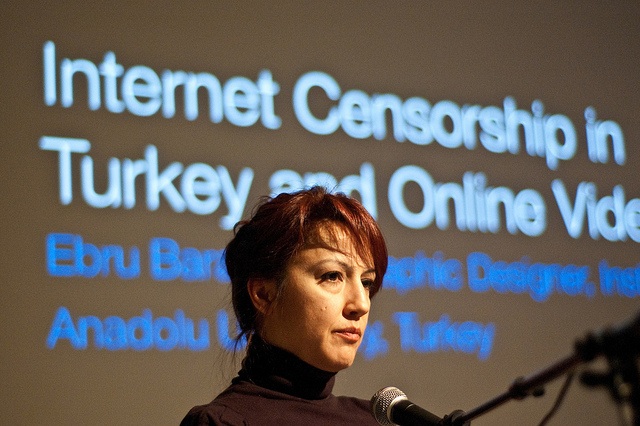As if the Internet Gods had planned it all along, Ebru Baranseli gave a report on the current situation of Internet censorship in Turkey right on the World Day Against Cyber Censorship.
According to Baranseli, a professor of graphic design at Anadolu University, until 2001 Turkey’s government had a “hands off” approach to Internet regulation: “It was thought that the general legal system regulating speech related crimes was adequate.” But that line of thinking wouldn’t last long. From 2001 onwards the government started to intervene.
Still, “until 2005, the Internet in Turkey was a largely free medium,” said Baranseli, who also works as a digital activist against Internet censorship. It is after this year that the so called “Internet Law of Turkey” (Law 5651, passed in 2007) gets introduced and online content starts being regulated more rigorously.
Online video in particular got quite some attention. “In the past, video sharing websites such as Metacafe, Dailymotion, and Vimeo have been banned in Turkey,” reported Baranseli. In fact, Metacafe is still banned. But perhaps the most notorious case of Internet censorship in Turkey with regards to online video is when an Ankara court ruled in favor of blocking access to YouTube in May 2008. This was due to 10 videos regarding Ataturk, commonly known as modern Turkey’s founding father. It would take approximately 2.5 more years for YouTube to be legal again in Turkey (October 2010).
But the “Internet community,” as Baranseli calls it, has not stayed passive with regards to the Turkish government’s Internet censorship. For example, through sansuresansur.org (which translate to “censorship on censorship”) they’ve set about to inform people on the reality and dangers of Internet censorship. As part of their campaign they’ve made a series of videos which you can see through YouTube, although, from Baranseli’s report, it remains uncertain for how long Turkish people themselves may be able to see them. Here’s one with English subtitles.
[youtube]http://www.youtube.com/watch?v=k2jxDt63JJk[/youtube]
Even if to the eyes of somebody used to relatively unlimitted access to Internet websites, the add may seem a bit dramatic; it highlights how Internet censorship can, and does affect, even the more ordinary aspects of daily life. In a tragicomic anecdote Baranseli recalled how one of her graphic design students competed and eventually won a prize for a Vimeo competition, but since at the moment access to Vimeo was blocked in Turkey they couldn’t neither vote or even see the video.
You can find Baranseli’s presentation here.



